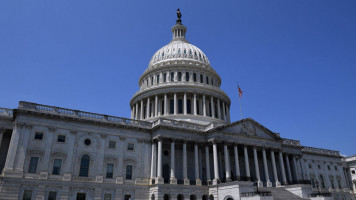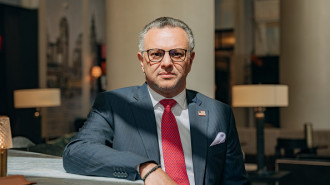Who is Sultan al-Jaber, the UAE oil boss heading COP28?
Sultan al-Jaber, leader of the United Arab Emirates' state energy giant ADNOC, was chosen earlier this year to head the COP28 climate summit starting Thursday in Dubai.
His appointment alarmed environmental critics concerned over his commitment to maintaining a role for fossil fuels in the energy transition. However, his supporters say he has an ability to get things done and straddle divides that will deliver climate action.
When marathon deliberations in Egypt’s picturesque city of Aswan in October struggled to reach an agreement on a fund to help countries recover from damage caused by climate change, Jaber leapt in.
In a virtual intervention, he told the 24-member UN committee debating the fund that billions of lives depended on getting a deal.
Jaber's message to the delegates made very clear he would not accept failure.
"You could say that he used the notion of the hard deadline to help bang heads," Avinash Persaud, negotiator for Barbados, who was a member of the technical committee and present at the meeting, told Reuters.
The stakes were high. Climate funding has caused bitter divisions between developed countries held largely responsible for global warming and poorer countries that are the most vulnerable to its consequences.
Another failure to agree on what is known as the "loss and damage" fund could derail discussions at COP28, which will run until 12 December. After a year of extreme heat, droughts, wildfires and floods, the UN talks will be the first global assessment of progress since the landmark Paris Agreement in 2015.
The October negotiations were supposedly the last chance to reach agreement on the fund, but a fifth extraordinary gathering took place in Abu Dhabi in November that agreed to make the World Bank the fund's interim home and encourage all countries to contribute.
The UAE is among a handful of high per-capita income countries that are not obliged to contribute to UN climate funds, but face pressure from European states to do so.
Oil riches and beyond
The UAE is a senior member of the Organisation of the Petroleum Exporting Countries (OPEC), and its wealth is built on oil.
It has plans to raise its production capacity to 5 million barrels per day (bpd) by 2027.
Jaber, born in 1973 in the emirate of Umm al Quwain, stands out in the UAE for the number of high positions he holds.
Nicknamed Dr. Sultan, he has a PhD in business and economics from Britain's Coventry University. He also studied in the United States.
In 2006, he was put in charge of Masdar, the UAE’s renewable energy vehicle, and set off on a global fact-finding mission to assess obstacles and opportunities.
As part of the tour, he met Olafur Ragnar Grimsson, who was then president of Iceland, which, drawing on ample geothermal reserves, has managed to more than meet its energy needs through renewable sources.
"He told me he had this vision that he wanted to make Abu Dhabi a centre for a renewable energy transformation," Grimsson told Reuters.
"On the face of it, it was almost an absurd proposition. But there was something in his eyes, and his enthusiasm that made me believe that he was serious."
Masdar has investments in over 40 countries and is still chaired by Jaber, its founding CEO, who since 2016 has also been the CEO of ADNOC.
No more silos?
Jaber's travels showed him the need to break down barriers that separate various aspects of the renewables industry, such as research, technology and finance, to get results.
Similarly, as the president of COP28, he has backed an inclusive approach, so oil and gas representatives, including OPEC Secretary General Haitham Al Ghais, will be in Dubai.
Without the inclusion of fossil fuel leaders in the climate conversation, Jaber says there can be no orderly transition to a low carbon economy.
The approach has alarmed climate activists.
Greta Thunberg called Jaber's appointment as president-designate to COP28 in January "completely ridiculous", while former US vice president Al Gore, a long time climate activist, has said fossil fuel interests have taken over the UN climate process.
In what has raised further alarm over Jaber's motives, leaked documents from Jaber's COP team have shown that the UAE had planned to discuss new fossil fuel deals with more than a dozen countries on the sidelines of the summit.
Such discussions would breach of regulations set by the UN body responsible for the climate negotiations, the United Nations Framework Convention on Climate Change (UNFCCC).
The UNFCCC says that a "cardinal principle" for COP teams and their leaders is the "obligation of impartiality".
Jaber's team did not deny the allegations, instead saying: "Dr Sultan al-Jaber is singularly focused on the business of COP and delivering ambitious and transformational climate outcomes at COP28."
Countries, such as the UAE, say coal, oil and natural gas must have a continued role, combined with technology to capture their emissions until new energy systems can sustain the world's needs.
On the other side of the divide are countries that say phasing out fossil fuel is the only way to achieve the Paris goal of limiting global warming to well below 2 degrees Celsius (3.6 degrees Fahrenheit), while aiming for a cap of 1.5C.
Jaber has maintained a phase down of fossil fuels is inevitable and essential, but as part of a comprehensive, thought-out energy transition plan that takes into account the circumstances of each country and region.
"One size fits all will not work so we need to be flexible and agile," he told Reuters in October.
"We should raise ambition and keep 1.5 as our north star so no-one loses sight."
Jaber courted more controversy this year when it was reported that his team had edited his Wikipedia page to insert flattering quotes about him, as well as to remove references to a multi-billion-dollar pipeline deal that he negotiated.
(Reuters and The New Arab Staff)

![Palestinians mourned the victims of an Israeli strike on Deir al-Balah [Getty]](/sites/default/files/styles/image_684x385/public/2024-11/GettyImages-2182362043.jpg?h=199d8c1f&itok=xSHZFbmc)


![The law could be enforced against teachers without prior notice [Getty]](/sites/default/files/styles/image_684x385/public/2178740715.jpeg?h=a5f2f23a&itok=hnqrCS4x)
 Follow the Middle East's top stories in English at The New Arab on Google News
Follow the Middle East's top stories in English at The New Arab on Google News


